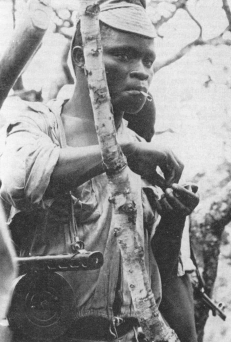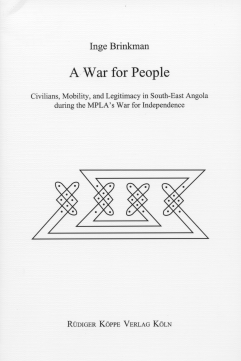

A War for People
Civilians, Mobility, and Legitimacy in South-East Angola during MPLA’s War for Independence
Author: Inge Brinkman. Series edited by: Michael Bollig, Wilhelm J.G. Möhlig †.
Series: HSA History, Cultural Traditions and Innovations in Southern Africa Volume 23
2005256 pp.
3 maps, 4 b/w photos, 4 tables, index
Text language(s): English
Format: 160 x 240 mm
470 g
Paperback
€ 49.80
Buy 'A War for People' as a downloadable PDF document directly from our online shop »
Order 'A War for People' as print edition »
The present study is an impressive testimony of how the Angolan Civil War that was waged with brute force on each side, changed and destroyed local cultures and that formed a “culture of violence” through many years. In this sense, Inge Brinkman’s monograph is of huge importance for the wider African context. Out of a genuine anthropological perspective, the author tries to give an insight of the violence and the war with the help of oral documentations.
The history of the countless African civil wars (Sudan, Somalia, Kongo or Liberia) are frequently understood and documented as a political history. In opposition to this, Brinkman convincingly offers a new perspective with the main subjects of fear, suffering and terror. The monograph is based on data collected between 1995 and 2000. Oral traditions of the fugitives of the Angolan Civil War in Northern Namibia as well as the extensive study of historical sources in Portuguese archives are collected in this work.
It deals with the topic of the first stage of the Angolan War for Independence in South-East Angola, i.e. the space of time from 1960 to 1974. The study starts with an informative introduction which outlines the political history of South-East Angola in an interesting way as well as it discusses basic methodological questions which are subject of recent theoretical debates. This work deals with different experiences of violence and works out their cultural meanings. Violence turns into a change agent, i.e. violence changes personal references, social formations and conviction systems. These changes are elaborated with a strong sense of comprehension of personal nuances.
Brinkman succeeds in representing her informants not only as victims, although their memories clearly revolve around suffering, pain, grief and destruction, but also show their scope of action, flight strategies, non-cooperation and open resistance.
About the author:
Since October 2015, Inge Brinkman is working as professor for African Studies at the Department of African Languages and Cultures at Ghent University. Her fields of research include African literature and African popular culture from a cultural-historical perspective. She is engaged in research on gender, oral narrative and monster studies, and on autobiographical writing in Africa. Geographically the focus is on Central Kenya and Namibia/Angola.
Under these links you will find publications by the author and further ethnographical and ethnohistorical studies of southern Africa:
Accompanying material:
- “Grandmother’s Footsteps”
(ISBN 978-3-89645-056-2 ) - Afrikaner schreiben zurück
(ISBN 978-3-89645-053-1 ) - Cultural Change in the Prehistory of Arid Africa
(ISBN 978-3-89645-092-0 ) - Die südafrikanische Militärverwaltung (1915–1920) und die frühe Mandatszeit (1920–1936) in der Kavango-Region / Namibia
(ISBN 978-3-89645-360-0 ) - Ethnische Grenzen und Frontlinien in Angola
(ISBN 978-3-89645-356-3 ) - Herrschaft, Macht und Einfluß
(ISBN 978-3-89645-359-4 ) - Language Contact, Language Change and History Based on Language Sources in Africa
(ISBN 978-3-89645-093-7 ) - Singing in the Bush
(ISBN 978-3-89645-355-6 ) - The Kavango Peoples in the Past
(ISBN 978-3-89645-353-2 ) - The Mbukushu in Angola
(ISBN 978-3-89645-350-1 )
Cross-reference:
- Alfred Schachtzabels Reise nach Angola 1913–1914 und seine Sammlungen für das Museum für Völkerkunde in Berlin
(ISBN 978-3-927620-21-6 ) - Die ethnographische Sammlung aus Südwest-Angola im Museum von Dundo, Angola (1954). Katalog
(ISBN 978-3-89645-161-3 ) - Frühe Kolonialgeschichte Namibias, 1880–1930
(ISBN 978-3-89645-058-6 ) - Great Zimbabwe
(ISBN 978-3-89645-210-8 ) - Studien zur Geschichte Angolas im 16. und 17. Jahrhundert
(ISBN 978-3-927620-96-4 ) - The Kalahari Ethnographies (1896–1898) of Siegfried Passarge
(ISBN 978-3-89645-141-5 ) - Trommeln in der Kirche
(ISBN 978-3-89645-917-6 ) - Vorkoloniale Geschichte und Expansion der Avungara-Azande
(ISBN 978-3-89645-209-2 )
Reviews
Using archival sources, secondary literature but also interviews with more than 90 informants Brinkman portrays the course of events from a close perspective.
Ulrich Oberdiek in Anthropological Abstracts, www.anthropology-online.de/Agao6/0066.html, 1
[...] Brinkman has produced an account of a central, and neglected side of this and most other wars – she has given voice to those who have suffered through it, and this merits attention and respect.
Reinhart Kößler in afrika-spectrum, 2/2007, 390-391
| « back | Print version | [top] |
 Books
Books Audio
Audio Biographies
Biographies Series
Series Festschrifts
Festschrifts Journals
Journals